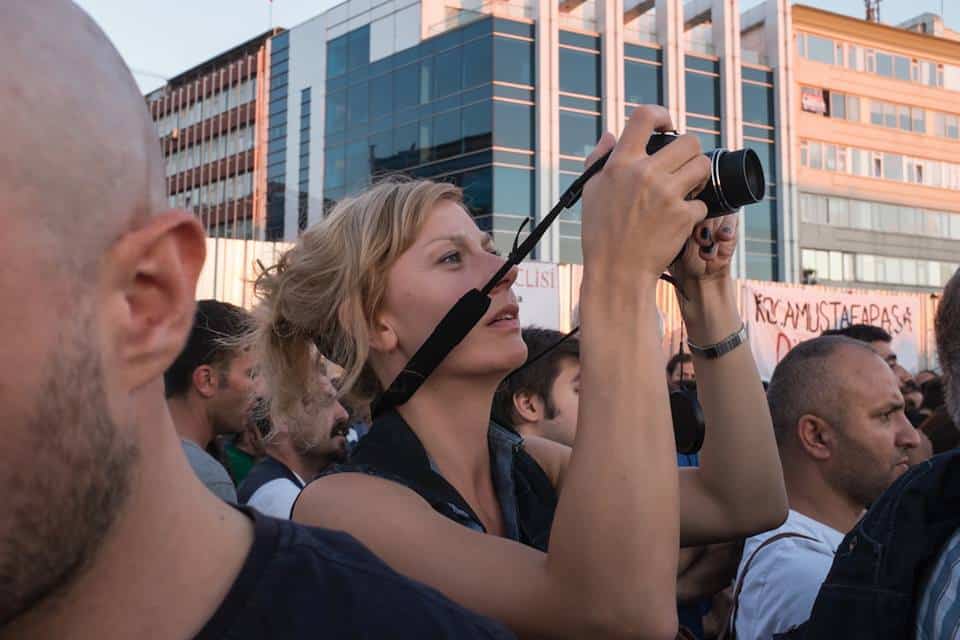
Meet Agata Blaszkowska, a woman who has worked on rural development programs in eastern Turkey and more recently collaborated with her friends on a few projects, such as Istanbulswap and ‘sofa city’. Want to learn more about Agata? Read below!
Why did you come to Istanbul?
Once, when I was still in London I was listening to a show on the radio and one of the guests was describing her culinary experience in Istanbul. She said that it is an absolute must to have traditional fish in a bun in Anadolu Kavağı, where you can enjoy this simple delicious meal looking at another continent and the waters of the Bosporus mixing with those of the Black Sea. Her description was so vivid and was haunting me ever since, so when the opportunity arose I decided to pack up, go to Istanbul and eat that fish in the mythical place that serves as the bridge between Europe and Asia. Five years later, I still enjoy Anadolu Kavağı and balık ekmek.
What do you do here?
At the moment I am working as an English Instructor at Kadir Has University. However, teaching has been my profession for only a couple of years. As a graduate of sociology and social development I was looking for a job in my field and that’s how I came across Hüsnü Özyeğin Foundation and got involved in the development work they were doing at the time. I participated in designing a microfinance fund, which was a part of a broader rural development project designed and implemented in few small villages in the East of Turkey. Taking a trip to that part of the country and being able to access remote villages and talk to the people living there was an amazing experience I will always cherish.
What is the biggest challenge you’ve faced here?
I have to say one of the biggest challenges would be getting to your top floor apartment without stumbling on one of the many pairs of shoes displayed in front of everybody’s door during Bayram. Another thing is, traditionally, the language. It’s not easy to remember and smoothly pronounce words like: terbiyesizliklerinden…yes it is one word, not a tongue twister…
What do you do for fun?
As a megacity, even if it’s not too cosmopolitan, there are plenty of activities Istanbul has to offer to pass the time. I really like following the arts and visiting art galleries around the city. The big ones like Arter, Salt or Galerist which mostly show work of accomplished artists, but also smaller places (Pi artworks, Mixer or PG art gallery in Tophane or Park Art Istanbul in Kadıköy) which exhibit the newcomers to Turkish art scene are all worth seeing.
Between work and my hobbies I try to find time to do some projects with friends. Being impressed with ‘freecycle’, a community promoting environmentally friendly exchange without money, two of my friends and I established a Facebook group Istanbulswap, a platform to exchange products and skills. We organized a couple of small swapping events both in Beyoğlu and Kadıköy, which were also a good opportunity to meet new people.
Another project we did was called ‘sofa city’. We visited different neighbourhoods in Istanbul (Moda, Cihangir and Tarlabaşı) with an inflatable sofa, invited passers-by to take a sit and tell us about ‘their’ Istanbul. You may have a look at parts of the interviews and some of the photos on this blog: http://istanbulproject.blogspot.com.tr/
Where do unwind/relax? Where is your favourite haunt?
I really enjoy the Turkish meyhane culture, with melancholic fasil music, meze, rakı and long conversations. After eating at many meyhane in this city I can definitely recommend ‘Meyhane’ in Kadıköy and ‘Hatay Meyhanesi’ in Bostanci, both of which have delicious food and a quiet, local atmosphere. The walls of the letter are covered with old pictures and newspaper clippings about a famous Turkish poet Cemal Süreyya, who was a recurring guest. Additional star granted for absence of the guys, who usually try to lure you in by saying ‘hello lady. Come, eat here’, in all possible languages.
What has been your biggest surprise about Istanbul?
The fact that no matter how state-of-the-art my mobile phone is everyone on the bus will have better ones anyway. And on the more serious note the size and the pace of urban renewal in the city, which has sadly been implemented without regard for local communities and the environment.
Do you have any advice for other expats?
Unless you don’t mind deserts with melted cheese or chicken in it, make sure you know the ingredients of some traditional Turkish sweets. Buy a box of chocolates for one of the officials at your local branch of ‘yabancılar şubesi’, it can really come in handy. Learn Turkish as fast as you can (at least to get by) not only to get to know the culture, but also to avoid being treated like a tourist months or years after your arrival to the city.









